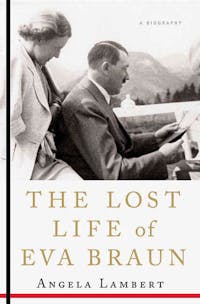The Lost Life of Eva Braun
A Biography
 Download image
Download image
ISBN10: 0312378653
ISBN13: 9780312378653
Trade Paperback
544 Pages
$30.99
Longtime companion and eventual wife of Adolf Hitler, Eva Braun is one of history's most famous nonentities. She has been dismissed as a racist, feather-headed shop girl, and yet six decades after her death her name is still instantly recognizable. She left her convent school at the age of seventeen and met Hitler a few months later. She became his mistress before she was twenty. How did unsophisticated little Fräulein Braun, 23 years his junior, hold the most powerful man in Europe in an exclusive relationship that lasted from 1932 until their joint suicide? Were they really lovers, and what were the background influences and psychological tensions of the middle-class Catholic girl from Munich who shared his intimate life? How can her ordinariness and apparent decency be reconciled with an unshakeable loyalty to the monster she loved?
She left almost no personal material or documents but her private diary and photograph albums to show that her life with Hitler, far from being a luxurious sinecure, caused her emotional torture. His chauffeur called her "the unhappiest woman in Germany." The Führer humiliated her in public while the top Nazis' wives, living in his privileged enclave on a Bavarian mountainside, despised her. Yet Albert Speer said: "her love for Hitler—as she proved in the end—was beyond question."
Reviews
Praise for The Lost Life of Eva Braun
"By painstakingly examining the thin trail of evidence left behind by Braun, Lambert wonders whether all German women, from the least famous to her infamous subject, should be condemned for the horrific deeds of their men. If Braun can be absolved of guilt, she suggests, so can most German women . . . 'Any verdict on Eva is, in microcosm, a verdict on the German people,' she writes . . . The woman who finally married Hitler right before committing suicide with him in his bunker in Berlin at the end of the war, Lambert argues, was caring, sensitive and, above all, loyal. She claims that the former photo shop assistant was smarter than is commonly assumed—but 'blissfully ignorant' of politics, which was considered men's business . . . Although Lambert concedes that even ordinary citizens couldn't be clueless about the fate of the Jews after Kristallnacht in 1938, she largely dismisses the notion that Braun and most other Germans could have known the full extent of the horrors of the deportations and the camps. She also argues that the widespread anti-Semitism of German women . . . who remained 'unthinkably prejudiced against Jews' even after the war, didn't overshadow their positive traits, such as love of family."—Andrew Nagorski, a senior editor at Newsweek International and author of The Greatest Battle: Stalin, Hitler and the Desperate Struggle for Moscow That Changed the Course of World War II, in The Washington Post
"Lambert cites the remarkable fact that while Hitler has over 700 biographies, his long-time mistress and wife (for 36 hours), Eva Braun, enjoys just two in English—the first long out of print and now this one. Since her death at age 33 in the bunker alongside her beloved Adolf, Braun has been dismissed as a vivacious but flighty and not overly intelligent companion with a perverse adoration of the fuehrer. In her magnificent, sensitive and finely written bio, Lambert does not wholly undermine this perception, but for the first time Braun emerges as a fully rounded, complex individual both liberated and imprisoned by her relationship with Hitler, a relationship assiduously dissected here and that exemplifies the meaning of 'opposites attract.' She was, for instance, the only person allowed to smoke in the abstemious fuehrer's presence, and she was as Catholic as Hitler was militantly self-worshiping. No one in Hitler's retinue ever understood their mutual attraction, though perhaps Albert Speer was closest when he said that for Hitler Braun was 'incredibly undemanding'; as for Braun's infatuation, Lambert herself remains bemused, but her behind-the-scenes tale of an extraordinary man in love with a most ordinary woman is a revelation."—Publishers Weekly (starred review)
"Growing up sheltered in a strongly Catholic family in Munich, Braun was barely out of her teens when she met Hitler in a camera store. Determined to win his affections, Braun molded herself into his ideal woman and was ultimately able to insinuate herself in the future dictator's life. By the time of their mutual suicide in the Führerbunker in April 1945, says Lambert, Hitler came to love Braun, albeit in a complicated and selfish way. Only the second biography of Hitler's mistress to be published in English, this one deserves praise for trying to understand Braun's complexities in their own right, rather than as a window into Hitler's psyche. Lambert offers a persuasive portrait of Braun as patient, dignified, occasionally jealous, and genuinely devoted to Hitler. Perhaps controversially, Lambert also concludes that, while 'blameworthy' in the Catholic sense of the term, Braun knew little about the Holocaust and should not be condemned for her failure to intervene. Willing to speculate about that which is unclear from the historical record, Lambert's exuberance for her subject makes this a fascinating read."—Brendan Driscoll, Booklist


